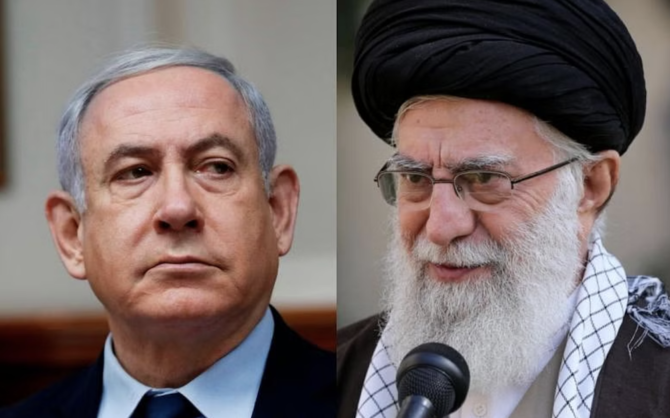Yossi Mekelberg
As such, it is no surprise when Israel carries out airstrikes, either in Lebanon or Syria, and even beyond, since it has been engaging in such operations for years in what the Israeli military calls the “campaign between wars,” aimed at containing what it sees as Iran’s aspirations to regional hegemony.
In most cases, these airstrikes, or other clandestine operations, directly target Iran or its proxies across the Middle East, mainly the Lebanese Hezbollah. This campaign has now been conducted for over a decade, but the assassination on Monday of Brig. Gen. Mohammed Reza Zahedi, commander of the Islamic Revolutionary Guards Corps’ Quds Force in Syria and Lebanon, and the rather safe assumption that Israel is behind it, was a step-up in what is already a volatile and fragile regional instability, much of it caused by the war in Gaza.
Tehran’s immediate response of vowing retaliation at a time, place, and scope of its choosing was not surprising, but it brings Israel and Iran closer to direct confrontation, potentially embroiling the wider Middle East to an even greater degree.
The concept of the “campaign between wars” is one of low-intensity, integrated, and pre-emptive warfare aimed at keeping Iran and its proxies guessing and unsettled, and permanently on the defensive. Yet, over the past six months the circumstances have changed radically and, consequently, there is a real danger of war by miscalculation, as every move by any of the actors involved is perceived as part of a grand plan for eliminating the other side. It makes an unintentional escalation, and even a full-blown confrontation a real possibility, one that could drag the entire region into war and chaos.
Both its main target, Zahedi, and the location of the attack, Iran’s consulate in Damascus, make this attack different from past incidents in its implications. It suggests that at this point Israel is putting a premium on deterring Iran and its Lebanese proxy Hezbollah, and is prepared to take the risk of edging closer to escalating its current hostilities with Hezbollah along its border with Lebanon and to a possible direct confrontation with Iran.
On the other hand, Israel might be deliberately provoking Tehran in the hope that Hezbollah will retaliate and thereby give it a pretext to launch a massive attack on the militia group, a scenario favored by quite a few of Israel’s political leaders and military commanders, who see the militant organization as a much greater existential threat to Israel than Hamas in Gaza. And judging by how Israel is conducting its war in Gaza, one can only imagine how intense and lethal a war in Lebanon would be.
Israel’s attack on an Iranian diplomatic building in Damascus is legally a direct strike on Iran’s sovereignty. Moreover, considering that Zahedi was the highest-ranking Iranian military commander to be killed since Qassem Soleimani, who led Iran’s IRGC operations in two of the most crucial countries for Iran in the region, died in a 2020 US drone strike, the fear of the situation getting out of hand is genuine.
In response to the attack, Iran’s Supreme Leader Ayatollah Ali Khamenei has promised revenge and declared that “the evil Zionist regime will be punished at the hands of our brave men. We will make them regret this crime and the other ones.” For Iran the loss of Zahedi must be disruptive of its operations in Lebanon and Syria, but equally also of its sense of pride. Whether Tehran is capable of once more swallowing its pride and thus avoiding a possible direct confrontation with Israel and then with the US as a result, remains to be seen, but there are growing voices within the regime calling for immediate and forceful retaliation.
It has also become apparent that Washington is seeking to distance itself from this Israeli military operation. According to the US-based news website Axios, it has told Iran that “it had no involvement or advanced knowledge of an Israeli strike on a diplomatic compound in Syria.” This is clearly a US attempt to prevent the incident from escalating, by almost suggesting that at least in this case Israel has gone rogue. Israel, by not sharing its intentions before embarking on such a sensitive operation — one with much wider implications for the US, too — is helping Washington by not implicating the US.
On the other hand, its action can only further anger a Biden administration that appears to be losing its ability to influence Prime Minister Benjamin Netanyahu. By testing Tehran’s patience, but not coordinating such a significant operation with the Americans, Israel tests theirs, too, especially as relations between the two allies are more strained than ever as a result of the war in Gaza, and Israel’s ignoring calls for a truce, and preventing further humanitarian aid from reaching Gaza.
What is most baffling about the attack in Damascus is to decipher what Israel is trying to achieve by blatantly exacerbating another front when it is already deep in the quagmire of the war in Gaza and has lost most of the international support it enjoyed only six months ago. Israel is increasingly falling into a pattern of open-ended conflicts with no clear endgame, which rather than serving its interests, or those of any of its allies, is only helping to unnecessarily prolong its wars, which gives Netanyahu an excuse, albeit a flimsy one, to remain in power.
Iran’s hegemonic aspirations are a source of instability in the region and are hardly in question. Its support of Hamas and Hezbollah poses a threat to Israel, to which the latter must respond.
However, Israel has no means to militarily eliminate this threat altogether, and as the war in Gaza has proven, even a lesser military force such as Hamas cannot be eradicated.
Military deterrence is an important element of dealing with the Iranian threat, but more importantly Israel needs astute political and diplomatic cooperation and coordination with its regional and international allies who are equally concerned about Iran’s adventurism, without provoking or humiliating Tehran.
To humiliate Iran rather than defeat it might give Israel some short-lived satisfaction, but it might also open another front, and this time while the international community is less sympathetic. And as past experience has made clear, whenever one senior Iranian figure is assassinated, a replacement is quickly found, while the root causes of the conflict remain and are further aggravated.







